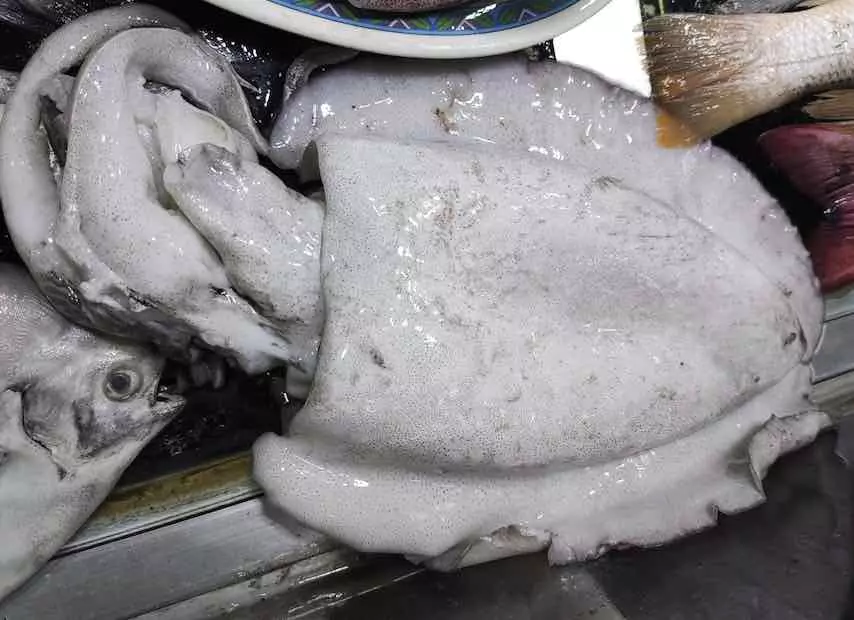If you’re a seafood lover, you might have wondered if you can eat Squid. Squid is a low-calorie, high-protein food rich in vitamins and minerals.
It is also a good source of omega-3 fatty acids essential for heart health.
Summary
Squid is a tasty and nutritious seafood that can be enjoyed in various ways. Here are some key takeaways:
- Squid is a good source of protein, vitamins, and minerals.
- Raw Squid can be eaten, but it should be frozen at a certain temperature for a minimum of 14 days to ensure safety.
- The tentacles and muscular body of the Squid are edible. Still, the head and internal organs should be removed before cooking.
- Squid can be steamed, fried, or dried; each method has nutritional value.
- When buying Squid, look for fresh, firm, and odorless ones. Avoid soft or slimy Squid, which may indicate spoilage.
Can You Eat Squid?
Squid is generally considered safe to eat, but you should only eat the tentacles and the muscular body. To clean the Squid, remove the head and tentacles from the body and remove the skin and fins from the body.
Turn the body inside-out, remove the central bone, wash out the inside of the body, and turn the body back into its original shape.
Squid can be eaten raw, but it should only be eaten raw if frozen at -18°C for a minimum of 14 days.
| Pros | Cons |
|---|---|
| Squid is high in protein and low in fat. | Squid can be high in mercury, so it should be eaten in moderation. |
| Squid is a good source of vitamins and minerals, including vitamin B12, iron, and zinc. | Some people may be allergic to squid or other shellfish. |
| Squid is versatile and can be cooked in many different ways. | Squid can be tough if not cooked properly. |
Pro tip: When cooking squid, it’s important not to overcook it. Overcooked squid can become tough and rubbery. To avoid this, cook squid quickly over high heat or simmer it gently for a longer period of time.
How does it taste like?

Squid has a mild taste with sweet notes. It is quite meaty, and the meatiness of squid is comparable to that of lobster or shrimp. If cooked properly, squid should be slightly firm but still tender enough to enjoy.
Squid should also not have a very strong fishy taste, which makes it surprisingly useful for many different situations.
Some people describe the taste of squid as mostly sweet with a hint of seafood taste. The texture of squid is also unique, with a firm and chewy bite that is different from most other seafood.
Squid meat can be cooked in many different ways, including grilling, frying, and boiling, which can affect the taste and texture of the meat.
Sources: foodsguy.com, bonappetit.com
Can You Eat Squid Raw?

Yes, you can eat raw squid, but it’s important to take certain precautions to avoid health risks.
Raw squid contains a type of bacteria called Vibrio, which can cause food poisoning if consumed in large amounts. Therefore, it’s recommended to freeze squid before eating it raw to kill any harmful bacteria.
The freezing process should be done at a temperature of -20°C for at least 24 hours to ensure that all bacteria are eliminated.
If you’re not sure whether the squid has been frozen or not, it’s best to cook it thoroughly to avoid any potential health risks. Cooking squid can also enhance its flavor and texture, making it a delicious addition to any meal.
| Pros | Cons |
|---|---|
| Raw squid is a delicacy enjoyed by many seafood lovers | Raw squid can contain harmful bacteria if not prepared properly |
| Freezing squid before eating it raw can eliminate harmful bacteria | Cooking squid can alter its taste and texture |
| Eating raw squid can provide health benefits such as high protein and low fat content | Raw squid may not be readily available or accessible in some areas |
Pro tip: When preparing squid, be sure to remove the ink sac and internal organs, as these can cause a bitter taste and stomach upset if consumed.
Nutritional Value of Squid
Squid is a low-calorie, high-protein seafood that is a good source of essential nutrients. A 4-ounce serving of raw squid provides:
| Nutrient | Amount |
|---|---|
| Calories | 104 |
| Protein | 18 grams |
| Fat | 2 grams |
| Carbohydrates | 3 grams |
| Fiber | 0 grams |
In addition to its macronutrient profile, squid is also a good source of micronutrients such as:
- Vitamin C
- Iron
- Calcium
- Vitamin B12
- Zinc
- Phosphorus
- Vitamin E
- Magnesium
However, it’s important to note that squid is also high in cholesterol, with a 4-ounce serving providing 507 milligrams or 169 percent of your recommended daily value.
If you’re at risk for heart disease, it’s recommended to limit your cholesterol intake to less than 300 milligrams per day.
Despite its high cholesterol content, squid can still be a healthy addition to your diet when consumed in moderation. It’s a versatile seafood that can be prepared in a variety of ways, making it a great option for those looking to add more seafood to their diet.
Pro tip: When purchasing squid, look for fresh, firm, and brightly colored specimens. Squid is best cooked quickly over high heat to prevent it from becoming tough and rubbery.
Health Benefits of Eating Squid
Rich in Protein
Squid is a great source of protein. A 100-gram serving of squid contains about 15 grams of protein, which is about 30% of the recommended daily intake for an adult.
Protein is essential for building and repairing tissues in the body, and it can also help you feel full and satisfied after a meal.
Source of Essential Nutrients
Squid is also a good source of essential nutrients. It contains high levels of vitamin B12, which is important for maintaining healthy nerve cells and red blood cells. Squid is also a good source of vitamin B6, which is important for brain development and function.
In addition, squid contains minerals such as zinc, copper, and selenium, which are essential for a healthy immune system.
Low in Fat and Calories
Squid is low in fat and calories, making it a great choice for people who are trying to lose weight or maintain a healthy weight. A 100-gram serving of squid contains only about 1 gram of fat and 92 calories.
This makes it a great alternative to other types of meat, which can be high in fat and calories.
Overall, squid is a healthy and nutritious food that can provide a range of health benefits. It is rich in protein, a source of essential nutrients, and low in fat and calories.
Concerns About Eating Squid
Is squid rich in cholesterol?
Squid contains cholesterol, but it is not exceptionally high in cholesterol compared to other animal-based foods.
A 3-ounce (85-gram) serving of cooked squid typically contains about 190 milligrams of cholesterol. However, squid is also a good source of lean protein and various essential nutrients, and it is low in saturated fat, which can have a greater impact on blood cholesterol levels.
Considering your overall diet and lifestyle is important when managing cholesterol intake. If you have specific dietary concerns or cholesterol-related health conditions, consult a healthcare professional or dietitian for personalized guidance.
Allergies
Like any shellfish, squid carries a risk of allergic reaction. A substance called tropomyosin is found in both shellfish and squid, which can trigger an allergic response in some people.
Symptoms of an allergic reaction to squid may include itching, hives, swelling, and difficulty breathing. If you experience any of these symptoms after consuming squid, seek medical attention immediately.
Mercury Content
The main health risks of squid and shellfish come from their mercury levels. Mercury is a toxic substance that can cause serious health problems, especially for pregnant women, nursing mothers, and young children.
Squid is considered a low-mercury seafood, but it still contains some mercury. To reduce your exposure to mercury, limit your intake of squid and other seafood to no more than two servings per week.
Cooking Precautions
When preparing squid, it is important to take certain precautions to prevent foodborne illness. Squid should be cooked to an internal temperature of 145°F to kill any harmful bacteria.
It is also important to properly clean and prepare the squid before cooking. To clean squid, remove the head and tentacles from the body, and remove the skin and fins from the body. Turn the body inside-out, remove the central bone, wash out the inside of the body, and turn the body back into its original shape.
FAQ
Here are some frequently asked questions about eating squid:
Yes, squid is generally considered safe to eat. However, it’s important to properly clean and cook it to avoid any potential health risks.
Yes, you can eat raw squid, but it’s important to ensure that it has been properly frozen to kill any potential parasites or bacteria. It’s recommended to freeze squid at -18°C for at least 24 hours before eating it raw.
The tentacles and the muscular body of the squid are edible. To clean squid, pull the head and tentacles off the body and remove the skin and fins from the body. Turn the body inside-out, remove the central bone, wash out the inside of the body, and turn the body back into its original shape.





Leave a Reply
You must be logged in to post a comment.